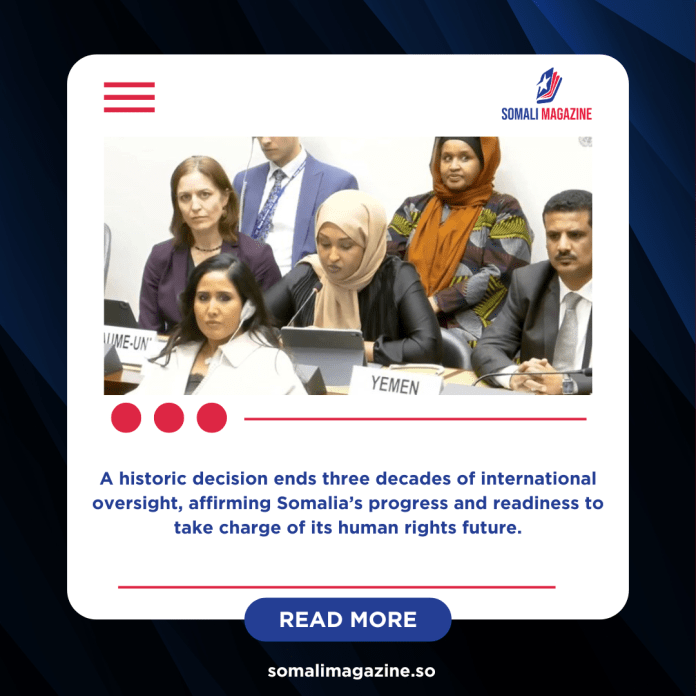The vote by UNHRC members represents a significant turning point for Somalia, as it reclaims full authority to oversee, protect, and report on its own human rights situation without external supervision. The move is widely seen as a symbol of Somalia’s growing stability, governance maturity, and renewed confidence from the international community.
Khadija Mohamed Al-Makhzoumi, Somalia’s Minister of Family and Human Rights Development, led the Somali delegation at the UNHRC session and hailed the outcome as a historic achievement. “This is a momentous day for the Somali people and a powerful testament to our nation’s resilience and progress,” she said. “We have demonstrated our unwavering commitment to building a future founded on justice, dignity, and accountability. We are prepared and eager to assume this sacred responsibility.”
Her statement reflects Somalia’s broader ambition to strengthen its domestic institutions and promote a rights-based culture within its governance framework. For decades, Somalia’s human rights situation was monitored externally due to years of instability and weak institutions. However, in recent years, the country has made steady progress in state-building, constitutional reform, and institution strengthening — all of which contributed to the UNHRC’s decision to restore full sovereignty in this area.
President Hassan Sheikh Mohamud welcomed the announcement, describing it as “a historic day” for the nation. He praised the progress Somalia has achieved in governance, institutional development, and democratic reforms. “Somalia has made significant progress in governance and is ready to independently fulfill its national and international obligations to respect and protect human rights,” the president said.
The Somali government expressed deep appreciation to the UNHRC and its member states for their trust and support. It also acknowledged the continued partnership of countries such as the United Kingdom, Qatar, and Turkey, which have played supportive roles in advancing Somalia’s human rights agenda and strengthening local institutions.
Officials emphasized that the end of international oversight does not mean the end of collaboration with global partners but rather the beginning of a new chapter based on equality and mutual respect. The Somali government reaffirmed its commitment to uphold international human rights standards and to continue engaging constructively with global institutions, while ensuring that the country’s systems and frameworks remain accountable to its people.
The UNHRC decision is widely viewed as a vote of confidence in Somalia’s ongoing reforms and a recognition of the nation’s resilience after decades of hardship. It highlights Somalia’s growing ability to take charge of its own development priorities and human rights responsibilities. For many citizens, it represents a step closer to full sovereignty, dignity, and international credibility — a sign that the country is moving from recovery toward renewal.


